Welcome back to This Week in Apps, the weekly TechCrunch series that recaps the latest in mobile OS news, mobile applications and the overall app economy.
Global app spending reached $65 billion in the first half of 2022, up only slightly from the $64.4 billion during the same period in 2021, as hypergrowth fueled by the pandemic has slowed down. But overall, the app economy is continuing to grow, having produced a record number of downloads and consumer spending across both the iOS and Google Play stores combined in 2021, according to the latest year-end reports. Global spending across iOS and Google Play last year was $133 billion, and consumers downloaded 143.6 billion apps.
This Week in Apps offers a way to keep up with this fast-moving industry in one place with the latest from the world of apps, including news, updates, startup fundings, mergers and acquisitions, and much more.
Do you want This Week in Apps in your inbox every Saturday? Sign up here: techcrunch.com/newsletters
Top Stories
Now is the time to build new social apps
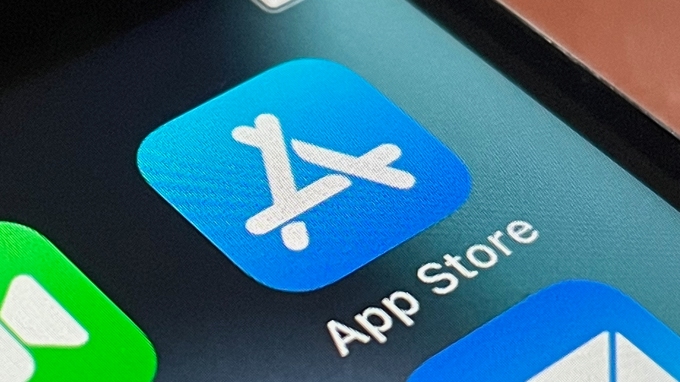
Image Credits: TechCrunch
Today’s dominant social networks are losing their grip on the youngest generation of internet users. Last month, we looked at how one of the world’s largest social networks, Facebook, had begun to fade in relevance — and was losing its position in the App Store’s Top Charts, as a result — while young people turned to apps like BeReal and TikTok instead. But there still seems to be this sentiment among a number of app makers that trying to compete in social is a lost cause. That’s not necessarily true anymore. Just as Instagram grew under Facebook’s shadow, there’s room for other apps to grow outside TikTok — an app that is today seen as more of an entertainment platform than a place to connect with close friends (though TikTok is pushing to change that).
BeReal’s rise is proof that alternative networks that prioritize real-world friendships can still find traction. In fact, younger people are hungry for a place to be themselves and keep up with their friends outside of feeds filled with creator content and targeted ads.
But BeReal’s long-term success is not a given at this point, even though the app currently has established itself as a leader in the App Store’s Top Five, and is often the No. 1 app, at times, in global markets. That’s a good start, but BeReal has yet to figure out key parts of its business, like monetization, and is struggling to communicate both with its own users and the wider public.
For instance, when the app went down this week, the company vaguely tweeted a statement — “yup, we’re on it” — that largely left its user base in the dark about what was going on. By comparison, when Instagram experienced a briefer, partial outage the following day, it spelled out that it understood the situation by noting that some people were “having trouble accessing Instagram,” and that it was working to fix things as quickly as possible and to stay tuned. It also added the #instagramdown hashtag to increase the visibility of its post.
The company is behaving poorly for an app in its position. There are times to be cute and cheeky with social media posts — but those times are not amid outages and other serious platform issues. BeReal’s misstep with users will be forgiven for now. But as the company scales, the team’s inability to communicate with its own users and the media could become a larger problem.
To date, BeReal has only offered off-the-record briefings with select press. It doesn’t have an in-house comms team. It doesn’t pitch or post to a blog to keep its users updated. It doesn’t even publish useful release notes on the App Store.
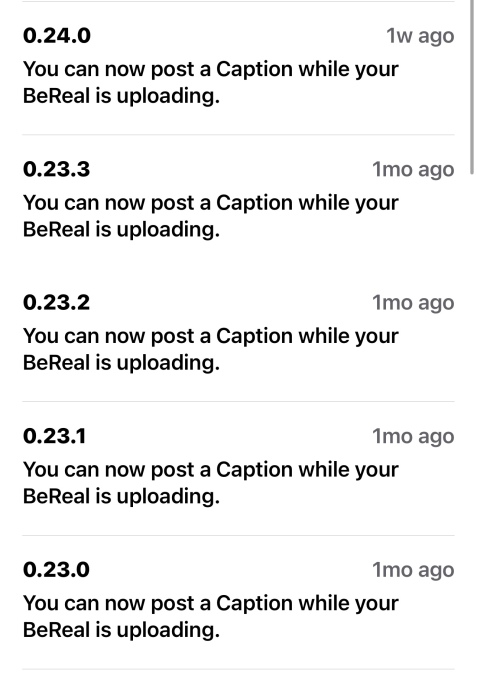
App Store release notes — so helpful! Image Credits: BeReal
And BeReal couldn’t respond to a series of simple questions about its outage — like what caused it or how widespread it was. This begs the question as to how the company will handle a more serious crisis — like a hack, data breach or another incident involving bad actors on its platform. It can get away with this for now — but not forever. Gaining the top spot on the App Store as Gen Z’s favorite social app also comes with responsibilities, and so far, BeReal has been dropping the ball on that front.
Remember that this is no longer some scrappy app maker, paying college students to download its new toy. The company raised a $30 million Series A, led by Andreessen Horowitz and Accel, followed by a Series B from DST Global, valuing the startup, pre-money at $600+ million. It’s time for BeReal to grow up.
BeReal’s missteps, however, could open the door to more social app newcomers who offer a service that’s built on more than a gimmick.
For what it’s worth, TikTok has realized this market still has tons of unclaimed territory. Last weekend, it rolled out its shameless BeReal clone, TikTok Now, as a standalone app in global markets outside the U.S. The new app already found some traction, moving into the Top 100 social apps on iPhone in five markets, and the Top 500 in 38 within roughly a day’s time. A couple of days later, it ranked in the Top 10 social apps in 39 countries and the Top 100 in 24. And it presents almost nothing new to users beyond a TikTok-produced version of the BeReal format with added support for video. (And maybe less horrible-looking selfies?)
If a complete knock-off like TikTok Now can climb the charts, imagine what a truly unique app could do. (Or even a newcomer that simply revives older social networking concepts for this modern era. Time to bring back Path?) There are few times when it would make sense to build a social app. But as the old guard is inching toward retirement, that time is surely now.
YouTube takes on TikTok with creator ad share for Shorts
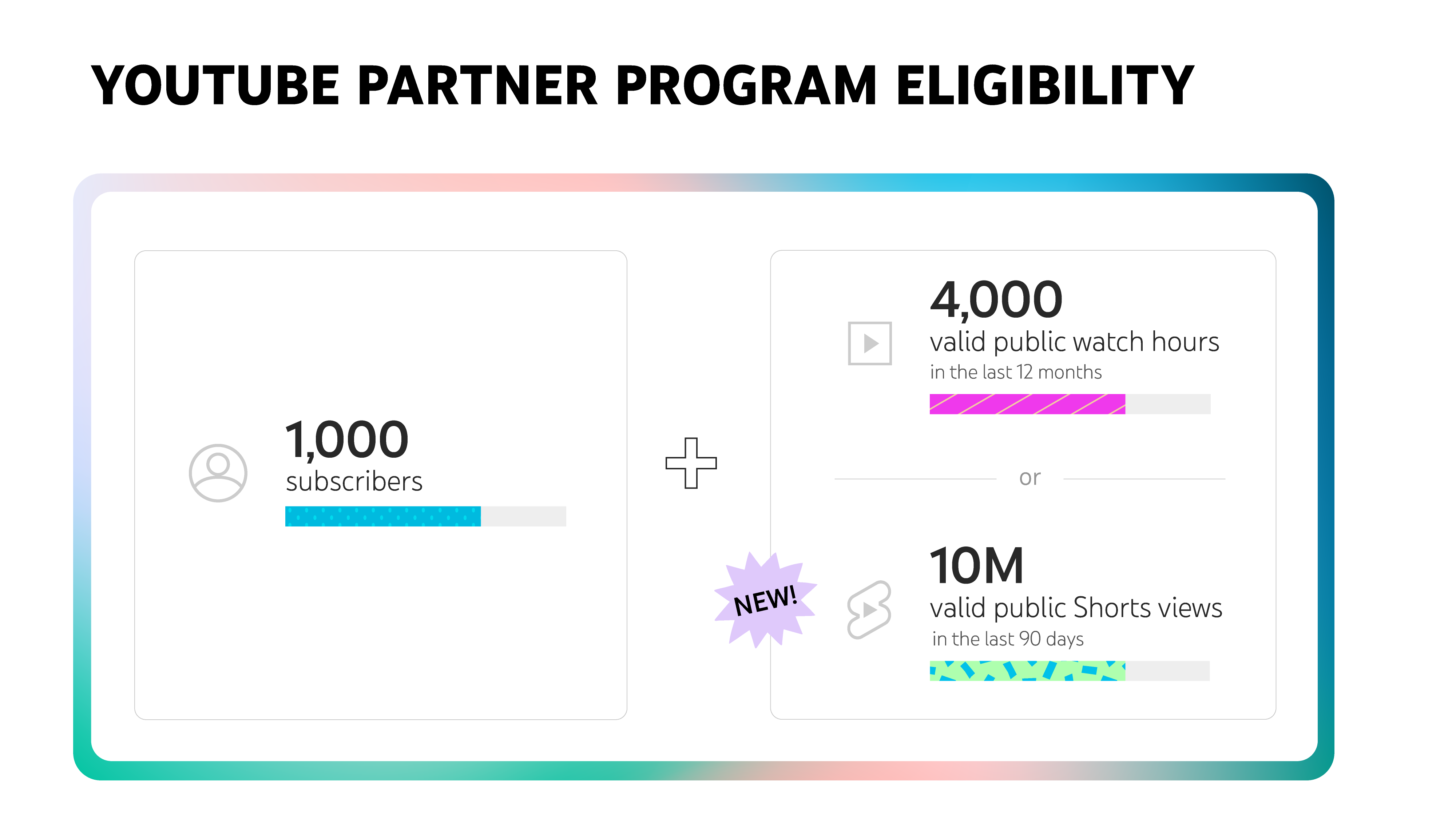
Image Credits: YouTube
YouTube has stopped messing around. It’s taking on the TikTok threat in a way that not only benefits its competitive position in the short-form video market, but one that allows it to expand its ad load across a new surface. This week, the company announced Shorts creators will now qualify for its revamped YouTube Partner Program, which allows them to earn ad revenue from YouTube.
The existing Partner Program for long-form video requires YouTubers to have 1,000 subscribers and 4,000 watch hours. This won’t change. But starting in early 2023, creators will be able to apply to the program if they meet a new Shorts-specific threshold of 1,000 subscribers and 10 million Shorts views over 90 days. As members of the Partner Program, these creators will earn 45% of ad revenue from their videos. (Ads will run in-between Shorts and the money is pooled. Creators keep 45% of the revenue from the amount allocated to them, not to licensing. Some creators don’t think that’s a great deal, however.)
The changes are designed to onboard creators gaining traction or going viral on Shorts, whether it’s with original content or clipping from other people’s videos (which is totally okay with YouTube).
To further sweeten the pot, YouTube also introduced Creator Music — an online service where creators can choose music for their videos by examining the costs associated with licensing specific tunes or they can browse songs they can use without paying upfront. The latter opts them into a rev share with music rights holders.
Spotify gets into audiobooks
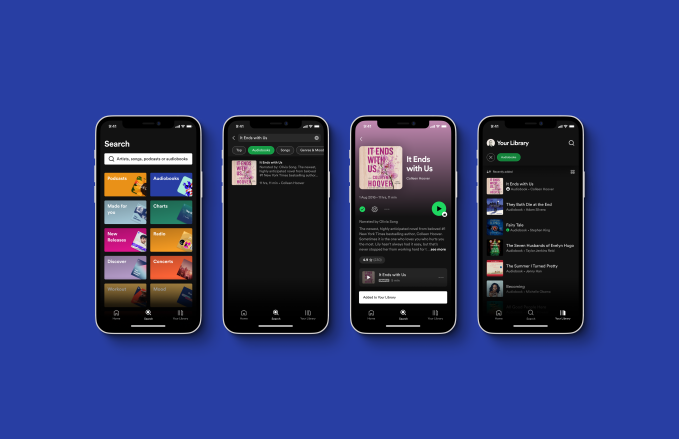
Image Credits: Spotify
Spotify believes audiobooks could be its next big revenue driver, so on Tuesday, the company launched its debut audiobook catalog in the U.S. with somewhere north of 300,000 titles to start. Initially, the selections in the app will be recommended by Spotify editors. But over time, the company says it plans to expand audiobooks to other markets, grow its selection and begin to use algorithmic recommendations to suggest books to users, as it does now with its other audio formats.
The company had earlier pointed to research indicating the audiobook industry is expected to grow from $3.3 billion as of 2020 to $15 billion by 2027. It forecast its audiobook sales could reach a gross margin of above 40%.
The books are found in a new Audiobooks hub in the app and are purchased à la carte at variable pricing — a move Spotify believes will allow lesser-known authors to find an audience. And notably, they’re not being sold via in-app purchases.
Instead, the app offers previews of the book’s content for free, but users will be directed to Spotify’s website to complete their purchases. Afterward, the purchased audiobook will be unlocked in the app and saved to the user’s library.
It’s worth noting Spotify’s ability to avoid in-app purchases on iOS follows a policy change Apple announced back in March which focused on “reader” apps — meaning those designed to provide access to digital content like music, books, videos or magazines. Apple said these apps could now use external links, if approved. Google, meanwhile, began piloting third-party billing earlier this year, with Spotify as its first customer.
Spotify didn’t clarify its agreements with the app stores, but says its model is “compliant.”
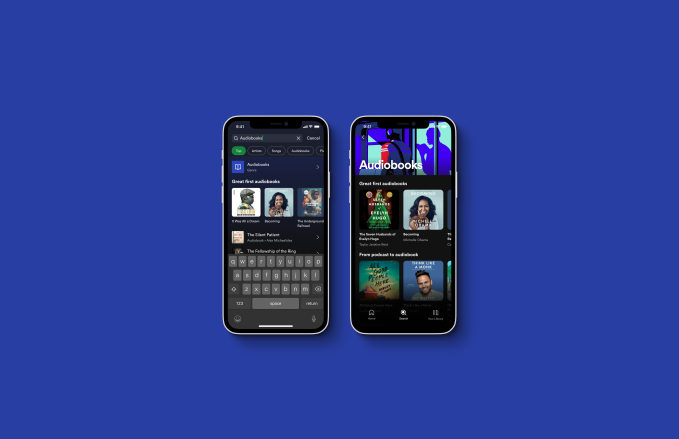
Image Credits: Spotify
Meta is sued for tracking users with a workaround to ATT
A new class action lawsuit claims Meta circumvented Apple’s App Tracking Transparency (ATT) privacy protections to track its users, even after those users denied the company permission to do so via the ATT prompt. The plaintiffs allege Meta had followed its users’ online activity by injecting JavaScript into the websites they visited when using Facebook’s in-app web browser. This was effectively a way to work around the protections ATT supposedly puts into place, the suit alleges. Meta has denied the claims, calling the lawsuit “without merit.”
Users rightly believe that when they opt out of tracking on iOS, they simply won’t be tracked. But that’s not necessarily true. Companies had been looking for workarounds to ATT since it was announced, Meta included.
This isn’t the first time an app has been suspected of using the browser to track users without their consent. This summer, TikTok was also accused of injecting code to track users’ keystrokes when users visited third-party websites from within the TikTok app. The company denied those claims as well, saying the app’s code was used for debugging, troubleshooting and performance monitoring, and for protecting users against spam and other threats.
The case will likely be highly technical but will be an interesting one to follow as the extent of ATT’s ability to protect consumers is decided.
Weekly News
Platforms: Apple

Image Credits: Matthew Panzarino / TechCrunch
- Apple released the first major update to its iOS 16 operating system with fixes that address issues with the camera shaking in some third-party apps on iPhone 14 Pro and Pro Max as well as the paste permissions bug which popped up a request to read the clipboard data too often, along with other issues. The company had earlier promised the fixes would be out next week, making Thursday’s launch ahead of schedule. Beta testers had noted the permissions bug and camera shaking issues had been resolved, suggesting Apple was nearing a public release.
- Apple said it would raise app prices and in-app purchases on the App Store in countries using the euro and in some Asian markets, starting October 5.
- Eagle-eyed iPhone owners noticed that Apple’s documentation said the use of the iOS 16 haptic keyboard feedback could impact your battery life.
- A report by The Information takes a look at how Apple’s App Store rules are impacting NFT startups. The marketplace apps take a percentage of sales but Apple would charge them a 30% cut, leading them to largely use their apps as NFT showcases without support for transactions.
Platforms: Google/Android
- Microsoft said it would expand Windows 11’s support for 20,000+ Android apps and games via the Amazon Appstore to 31 more countries within a few weeks.
E-commerce & Food Delivery
- Spain fined the food delivery app Glovo €79 million ($78 million) for denying 10,600+ gig-workers a labor contract following the implementation of the country’s “riders law” in August 2021, which required food delivery platform riders to be made employees on formal labor contracts.
- A new study ranked TikTok as the most valuable platform for DTC brands that are generating revenue of $1-5 million.
- Chinese e-commerce giant Pinduoduo’s overseas shopping app known as Temu managed to claim the top spot among Android shopping apps in the U.S. in mid-September before dipping to No. 15 this week.
Fintech
- Robinhood’s fintech app added Circle’s USDC as its first stablecoin, as Binance and WazirX exchanges plan to delist USDC in favor of other USD stablecoins.
- India’s central bank is working to expand UPI to several countries in Asia and the Middle East and elsewhere and is setting up an international subsidiary. In addition, a lighter version of the payments system, UPI Lite, is now live with eight banks, including HDFC, SBI and Kotak.
- Cash advance apps grew 69% year-over-year, more than other fintech sectors, Apptopia reported. Meanwhile, new installs of top consumer fintech apps were down 14% year-over-year in Q3, but were are up 19.4% over Q3 in 2020. The economy has driven some categories’ downloads higher, including budgeting and tracking apps, buy now/pay later apps and even traditional banking apps, while demand for mobile banks and teen banks declined.
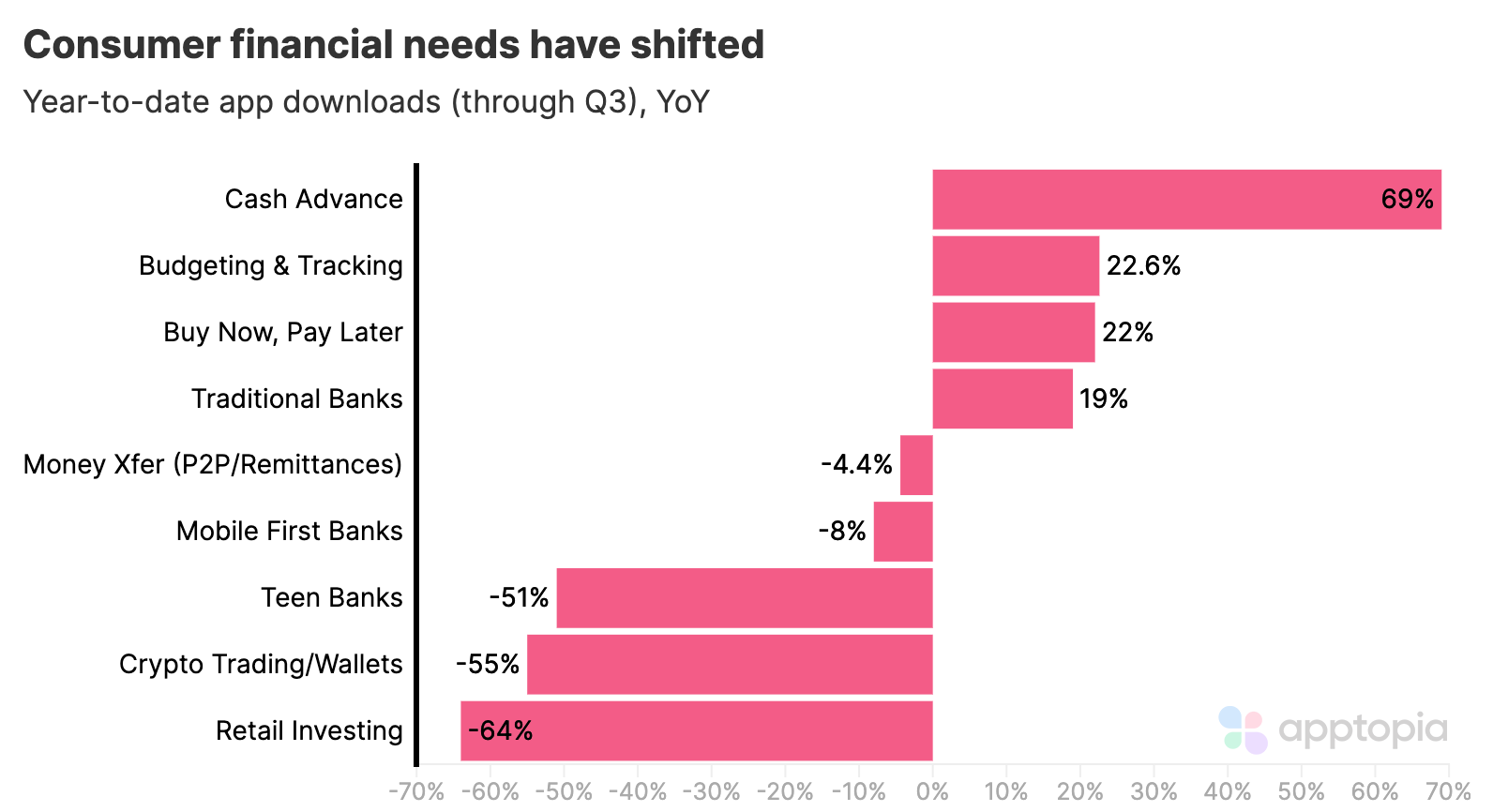
Image Credits: Apptopia
Social
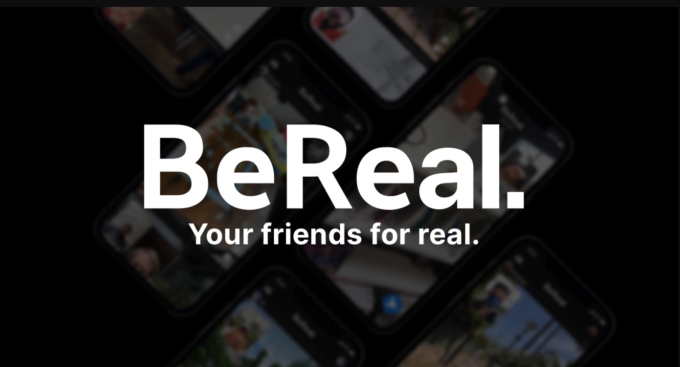
Image Credits: BeReal
- Gen Z’s new fav app BeReal experienced a multi-hour outage on Wednesday, tweeting vague things like “yup, we’re on it” and “all good now,” and refusing to answer further questions.
- Facebook launched a Reels API which allows sharing to Reels from third-party apps.
- Facebook added new Pages features designed to help creators get discovered and connect with their followers, including a way to make content exclusively available for top fans and subscribers, a way for creators to endorse other creators they like, a “rising creator” label and new post and story templates, among other things.
- TikTok expanded its political content policy guidelines to limit the ability of politicians and political groups to engage in fundraising on its platform, with a ban on the use of tipping, gifting and other monetization features for soliciting campaign donations.
- TikTok also launched a new feature for #BookTok fans in partnership with Penguin Random House that allows users to share and link to their favorite books within their videos. When clicked, the link directs viewers to a page with details about the book, including a brief summary and a collection of other videos that are linked to the same book.
- TikTok also rolled out its comment “dislike” button to users worldwide. The button, similar to Reddit’s downvote, allows users to signal which comments they think are irrelevant or inappropriate.
- Instagram is no longer breaking up Stories under 60 seconds into separate clips, it says. The change is rolling out worldwide.
- Bloomberg takes a look at the 70+ lawsuits against Meta, Snap, TikTok and Google where parents are holding the software makers responsible for their products with liability claims, which include blaming the algorithms for kids’ mental health issues.
- A Delaware judge ruled Elon Musk will be allowed to amend his counterclaims to argue that Twitter’s $7.8 million severance payment to whistleblower Peiter Zatko can be used to try to justify why Musk should be allowed to exit the acquisition deal.
- According to findings from a new Pew Research report that examined Americans’ use of social media for news consumption, 33% of TikTok users now say they regularly get their news on the social video app, up from just 22% in 2020. Meanwhile, nearly every other social media site saw declines across that same metric — including, in particular, Facebook, where now only 44% of its users report regularly getting their news there, down from 54% just two years ago.
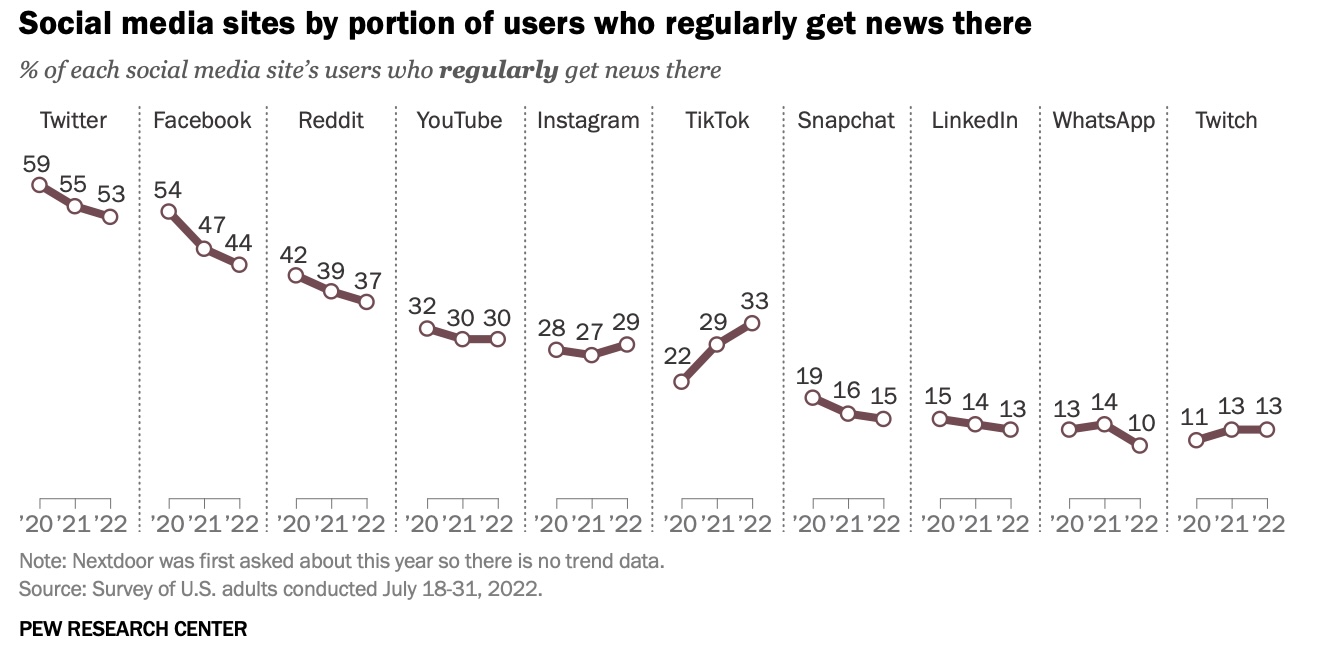
Image Credits: Pew Research
Photos
- Microsoft’s updated Photos app for Windows 11 begins rolling out to Windows Insiders. The new app introduces a new photo managing experience, with a new gallery, backup to OneDrive support, a “Memories” feature and more.
- Halide’s camera app for power users was updated with support for iPhone 14 Pro camera technologies, including 48MP ProRaw images, manual focus depth capture, the ability to switch between 48MP to 12MP capture quickly and other features. Obscura 3 also updated with support for the 48MP camera on iPhone 14.
Messaging
- A new bill in India aims to regulate over-the-top communication apps, like WhatsApp, Telegram and Signal, allowing the government to intercept encrypted messages in some circumstances, including in a public emergency or in the interest of public safety.
- WhatsApp’s Indian payments business lead Manesh Mahatme stepped down after 18 months and will be rejoining Amazon.
- Meta must pay the walkie-talkie app maker Voxer a royalty and $174.5+ million for violating two of its patents with Facebook Live and Instagram Live, a Texas jury ruled.
- WhatsApp announced an expanded partnership with Salesforce to allow businesses to manage their WhatsApp conversations with their customers from the Salesforce platform.
- Telegram announced a number of new features, including emoji statuses, dozens more emoji reactions available through a new panel, an expanded selection of custom emoji for Premium users, improved login flow and other updates.
- Instagram confirmed it’s developing a feature that would protect users from unsolicited nude photos in their DMs. The feature will be opt-in when launched to the public, according to findings in the app’s code.
- Signal is asking its community to run a Signal proxy if they can to help people in Iran reconnect.
Streaming & Entertainment
- Spotify launched a new space-themed digital destination on Roblox called Planet Hip-Hop, which will soon feature up-and-coming female rapper Doechii. The company had already launched its first music experience in Roblox, K-Park — a K-pop themed world — in May 2022.
- Sony Music pulled its catalog from Resso, TikTok’s sister app and music subscription service. The move follows reports that TikTok is developing a TikTok Music app that could bring a service like Resso to more markets, including the U.S.
- Triller settled its lawsuit with Timbaland and Swizz Beatz. The latter two parties said they had not been paid when Triller acquired their Verzuz last year. Deal terms weren’t disclosed.
Gaming
- Netflix added a new title to its gaming lineup based on its popular show “Nailed It!” The new game, Nailed It! Baking Bash, will launch on October 4, just before Season 7 of the bake-off competition series returns on October 5. The game is one of only a handful so far directly tied to Netflix’s TV shows, alongside its games for “Stranger Things” and the Exploding Kittens game, which will soon be a series. But the company intends to launch a number of games related to its shows, including those for “The Queen’s Gambit,” “Shadow and Bone,” “La Casa De Papel” and “Too Hot To Handle.”
- Logitech launched its $350 G Cloud Gaming Handheld powered by Android, which offers a 7″ display, a Snapdragon 720G and Xbox and GeForce Now cloud gaming support. The handheld arrives on October 17.
- The U.S. Dept. of Justice will be allowed to join the arguments in the Apple-Epic Games lawsuit, the court ruled. The Justice Department said it needs time to explain how the lower courts misinterpreted antitrust law. It’s also reportedly in the early stages of preparing to file an antitrust lawsuit of its own against Apple.
Health & Fitness
- With the Apple Watch Ultra launch, the App Store gained two more Apple first-party apps: Siren and Depth. The former is designed for emergencies when you’re hurt or lost and need someone to find you. It causes the watch to emit an 86-decibel sound pattern that can be heard up to 600 feet away. Depth is for underwater diving up to 130 feet (40 meters). Both are exclusive to the Ultra.
Utilities

Image Credits: Amazon
- Amazon announced it’s bringing a new accessibility option to its new line of Fire tablets with the addition of “Tap to Alexa” functionality — a way to interact with the company’s Alexa voice assistant without actually speaking.
Government & Policy
- Former employees from the App Association (ACT), which claims to fight for developers’ rights, told Bloomberg that the advocacy organization receives the vast majority of its funding from Apple, which also plays a dominant role in shaping the group’s policy positions.
Security & Privacy
- Swiss VPN app maker Proton VPN is pulling out of India over the country’s new rules requiring customer data collection. Others in the space have already left, including Surfshark and Nord.
- Unsealed court documents in a Facebook privacy lawsuit indicate that a number of apps from Zynga, Yahoo and others had extensive access to users’ friends’ data, similar to what happened with Cambridge Analytica.
- London-based fintech app Revolut confirmed a cyberattack had exposed the personal details of 50,150 of its customers, per a breach disclosure in Lithuania.
Funding and M&A
 Fintech Portabl raised $2.5 million in seed funding led by Harlem Capital Partners for its identity management and protection solutions for financial services, banking and consumer apps.
Fintech Portabl raised $2.5 million in seed funding led by Harlem Capital Partners for its identity management and protection solutions for financial services, banking and consumer apps.
 Alternative social network Parler restructured to operate under a new parent company known as Parlement Technologies and announced $16 million in funding to aid with infrastructure. Details of its backers weren’t disclosed, but previously the app had been backed by Republican donor Rebekah Mercer.
Alternative social network Parler restructured to operate under a new parent company known as Parlement Technologies and announced $16 million in funding to aid with infrastructure. Details of its backers weren’t disclosed, but previously the app had been backed by Republican donor Rebekah Mercer.
 Seattle-based retail software maker Swiftly raised $100 million in Series C funding at a $1B+ valuation for its grocery store retail software and branded apps.
Seattle-based retail software maker Swiftly raised $100 million in Series C funding at a $1B+ valuation for its grocery store retail software and branded apps.
 London-based fintech app Monese, which provides digital banking and remittance services to customers in Europe, raised $35 million from global banking giant HSBC.
London-based fintech app Monese, which provides digital banking and remittance services to customers in Europe, raised $35 million from global banking giant HSBC.
 Malaysia-based Respond.io raised $7 million in Series A funding led by Headline for its dashboard that helps businesses juggle multiple messaging apps to reach their customers.
Malaysia-based Respond.io raised $7 million in Series A funding led by Headline for its dashboard that helps businesses juggle multiple messaging apps to reach their customers.
 OYE, a Spanish/English wellness app backed by Colombian Reggaeton artist J Balvin, raised a $4.1 million pre-seed round led by MasterClass and Outlier.org co-founder Aaron Rasmussen.
OYE, a Spanish/English wellness app backed by Colombian Reggaeton artist J Balvin, raised a $4.1 million pre-seed round led by MasterClass and Outlier.org co-founder Aaron Rasmussen.
Tweets
This Week in Apps: YouTube takes on TikTok, Spotify adds audiobooks, BeReal takes a dive by Sarah Perez originally published on TechCrunch



